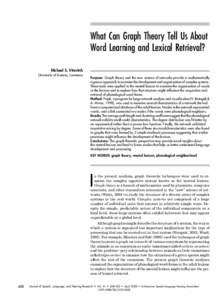
| Document Date: 2008-04-15 12:58:32
Open Document File Size: 182,61 KBShare Result on Facebook
Company Dell / Pearson / / Country United States / / Facility Michael S. Vitevitch University of Kansas / Massachusetts Institute of Technology / / IndustryTerm power-law degree distribution / localist neural network / given network / present network / power-law distribution / large systems / power law function / cognitive systems / lexical processing / power-law / catastrophic processing failures / power-law distributions / localist network / power-law and assortative mixing / present networks / semantic networks / real-world networks / large / scale-free network / power-law relationship / realworld systems / artificial neural network / power law / phonological network / random network / sized search space / scale-free networks / artificial neural networks / connected network / real-world systems / language processing / learning algorithm / grown network / random networks / power-law function / / Organization American Speech-Language-Hearing Association / University of Kansas / Massachusetts Institute of Technology / / Person Meg Vitevitch / Lori Lamel / Dave Shipman / Lawrence Purpose / Charles-Luce / Solé / Dennis Klatt / / Position adult native speaker / / ProgrammingLanguage Scala / / ProvinceOrState Kansas / Massachusetts / / Technology neural network / fracturing / /
SocialTag |

